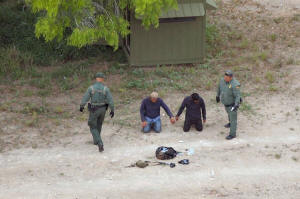|
Migrants at U.S.-Mexico border say
Trump's tough talk will not deter them
 Send a link to a friend
Send a link to a friend
 [April 05, 2018]
By Mica Rosenberg [April 05, 2018]
By Mica Rosenberg
MISSION, Texas (Reuters) - On Tuesday, the
same day that U.S. President Donald Trump announced his intention to
deploy military to help patrol the U.S.-Mexico border, Edwin Valdez and
four other Central American migrants were walking through dense brush at
a south Texas wildlife reserve, hoping to escape notice.
The men had illegally crossed into the United States that morning,
guided by a smuggler who had since abandoned them. Now they were lost
and uncertain how to proceed.
In vehicles nearby, U.S. Border Patrol agents had been alerted to
migrants moving through the area, and after detecting movement in the
bushes, they swooped in to arrest the men.
It was business as usual in the Rio Grande Valley, one of the busiest
crossing points for migrants trying to enter the United States
illegally.
In just a few hours that morning, 61 migrants, including Valdez, were
rounded up in the area. Ten, including four from China, were caught with
the help of a tracking dog in a sugar cane field. Two Hondurans were
taken into custody at a public park.

Several of those caught said they were unfazed by tough talk from Trump,
who has made headlines around the world with tweets railing about border
security and threatening to end the North American Free Trade Agreement
(NAFTA) unless Mexico does more to "stop the big drug and people flows."
Trump's renewed frustration about border security, rekindled over the
weekend by news of a "caravan" of Central American migrants moving
through Mexico toward the U.S. border, reflects the broader frustration
of his administration.
In the months after Trump took office, the number of migrants caught
along the U.S.-Mexico border fell dramatically, hitting a low of about
15,700 in April, from more than 42,400 in January 2017, U.S. Customs and
Border Protection data shows.
But arrests have crept back up since, and in the first months of 2018
have reached levels at, or near, those seen during the last year of his
predecessor, President Barack Obama.
Rising arrests of families and unaccompanied minors along the border are
a particular concern.
In March, their numbers surpassed the previous three years and "rivaled
fiscal year 2014, when we had a crisis," Manuel Padilla, chief of the
border patrol's Rio Grande Valley sector, said in an interview with
Reuters.
He said families with children, who are more difficult to deport
quickly, form about 49 percent of the current apprehensions in his
region. He said they often walk up to the first U.S. officials they find
to ask for help.
"It doesn't matter how many agents are out there," when it comes to
families, he said, "because this population is turning themselves in."
REVOLVING DOOR
Valdez, 20, who worked as an electrician's assistant in his home country
of El Salvador, said he previously tried to cross the border illegally
in 2016.
That time, he was picked up by border patrol officers after wandering
lost and dehydrated in the desert for four days. After six months in
detention, he was deported last year, but decided to travel north again
after gangs threatened him at his job.
[to top of second column]
|

Border patrol agents apprehend people who illegally crossed the
border from Mexico into the U.S. in the Rio Grande Valley sector,
near Falfurrias, Texas, U.S., April 4, 2018. REUTERS/Loren Elliott

While crossing has become more and more difficult in recent years,
Valdez said, need is a powerful motivator.
"Necessity forces people to leave their countries so they can bring
a better life to their families," he said. "That's why people are
willing to suffer through all this."
People like Valdez who have been previously deported can often be
quickly sent home.
Immigrants traveling with small children when caught, however, often
spend only a few days in custody because of a shortage of detention
facilities suitable for families and court settlements that preclude
prolonged detention of minors.
In the Rio Grande Valley, parents are often released with electronic
ankle monitors and ordered to appear with their children in court on
a specific date for deportation proceedings. Trump has railed
against the practice, which he calls "catch and release."
At the Hidalgo port of entry, one of the busiest crossings in South
Texas for legal trade and traffic across the U.S.-Mexico border,
Customs and Border Protection officers seemed largely indifferent to
the renewed rhetoric from Washington.
"Everyone who is in office has their own agenda, which is different
than the law. But the law is the law and that's what we are
enforcing," said Port Director Carlos Rodriguez, who has been with
the enforcement agency for 20 years. "That has been true
consistently through administrations."
For migrants like Jose Romero, 27, who made the harrowing days-long
trip through Mexico with his 8-year-old daughter in the back of a
dark cargo truck, threats from the president are little deterrent.


In his mountain home in Honduras, Romero made just $4 a day as a
farm laborer, not enough to feed his family of five, he said. After
his arrest at the border and subsequent release to wait court
proceedings, he said he doubted if migrants can be deterred.
"They will keep coming," he said, because of violence and poverty
south of the border. "The people are afraid."
(Reporting by Mica Rosenberg; Editing by Sue Horton, Clarence
Fernandez and Richard Chang)
[© 2018 Thomson Reuters. All rights
reserved.]
Copyright 2018 Reuters. All rights reserved. This material may not be published,
broadcast, rewritten or redistributed.
Thompson Reuters is solely responsible for this content. |